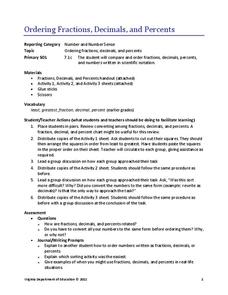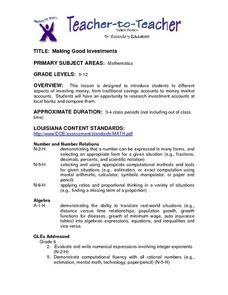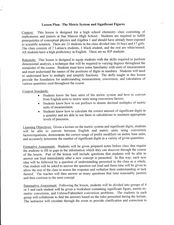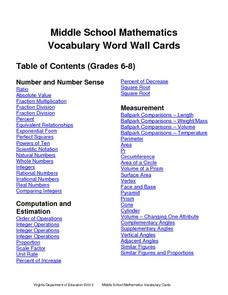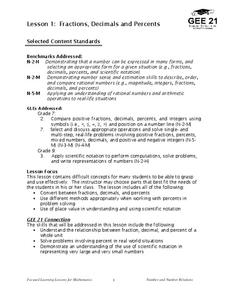Virginia Department of Education
Exponents
Expand your knowledge of exponents with an activity that promotes critical thinking and comparison skills. Middle and high schoolers compare numbers written in expanded and exponential form and explain their strategies for solving...
Curated OER
Astronomical Scales
Students describe the different units of measurement. In this space science lesson, students calculate astronomical distances using a scale. They explain the significance of using scientific notation in expressing very small or very...
Illinois State Board of Education
Solar System
Aspiring astronomers solve problems involving mixed units of the same attribute, including time, money, length, and area. They convert large numbers into scientific notation, then compute and compare ratios to explain why drawing...
It's About Time
Atoms and Their Masses
Are atoms too small to be isolated? Answer this question and more as you provide young chemists with the tools to conduct a hands-on activity demonstrating atomic mass. Pupils explore the mass of copper and aluminum, compare Dalton's...
Curriculum Corner
8th Grade Math "I Can" Statement Posters
Clarify the Common Core standards for your eighth grade mathematicians with this series of classroom displays. By rewriting each standard as an achievable "I can" statement, these posters give students clear goals to work toward...
Curriculum Corner
8th Grade Math Common Core Checklist
Ensure your eighth graders get the most out of their math education with this series of Common Core checklists. Rewriting each standard as an "I can" statement, this resource helps teachers keep a record of when each standard was taught,...
Virginia Department of Education
Ordering Fractions, Decimals, and Percents
Order up a resource on comparing rational numbers. Scholars order fractions, decimals, and percents by converting to a single form. They conduct a cut-and-paste activity ordering three sets of rational numbers.
Curated OER
Planets in Proportion
Students apply estimation strategies and proportional reasoning to determine a scale comparing the planetary bodies to Earth. They convert measurements of time and distance using scientific notation. Both the metric and customary units...
Curated OER
Ordering Rational Numbers and Finding Their Approximate
Middle schoolers explore the concept of ordering rational numbers on a number line. They represent rational numbers as decimals and percents. Pupils create a foldable about converting fractions to decimals to percents, and use a...
Lane Community College
Review Sheets: Introductory Physical Science
This hybrid worksheet connects mathematics to a science class. Learners practice solving problems that involve making a variety of conversions. An assortment of questions hits all the calculations needed for a middle school or beginning...
Curated OER
Unit 1, Worksheet 2, Calculator Worksheet
In this calculator activity, students explore place value, standard notation, and exponential notation. They add, subtract, multiply and divide positive and negative integers with and without a calculator. This three-page activity...
Virginia Department of Education
Partial Pressure
At some point, everyone has been under pressure—even Dalton! Explore Dalton's law of partial pressures with young chemists as they measure the volume of air extracted from a sample compared to its original volume. Class members perform...
Teach Engineering
Measuring Surface Tension
How do you measure surface tension? The fifth installment of a nine-part series is an experiment where young scientists use tubes of different sizes to measure surface tension. They calculate the average and standard deviation of the...
Curated OER
Save Your Change
Students solve problems involving exponential, logarithmic, and scientific notations. Using calculators, students explore investment problems. They use a formula and logarithms to determine the years to earn a particular income, figure...
Curated OER
Properties of Materials
Students describe how objects in the universe range from smaller than atoms to larger than galaxies. they explain how the metric system works and compare it to the English system of measurement.
Curated OER
Saturn’s Moons
Young scholars compare Saturn's moons to the Earth's moon. In this moon lesson students work in groups and complete a lab activity then answer questions.
Virginia Department of Education
Heat Transfer and Heat Capacity
It's time to increase the heat! Young chemists demonstrate heat transfer and heat capacity in an activity-packed lab, showing the transitions between solid, liquid, and gaseous phases of materials. Individuals plot data as the changes...
Curated OER
Salon Simulation
Students examine the role of the 'Salon'. In this historic communications lesson, students role play and use discussion to enhance their understanding of the role the Salon played in 18th century Europe. Students will divide into groups,...
Curated OER
Making Good Investments
Students compare different aspects of investing money from traditional savings accounts to money market accounts. They research investment accounts at local banks and compare them.
Curated OER
PLANETS IN PROPORTION
Students discover scales for both the solar bodies' relative sizes and their distances from the sun. They find equatorial circumference and volumes of their solar bodies. Students apply estimation strategies and proportioanl reasoning to...
Curated OER
The Metric System and Significant Figures
Students compare and contrast the English and Metric system. In this chemistry activity, students demonstrate how to convert English to metric and vise versa. They solve problems following the rules of significant figures.
Virginia Department of Education
Middle School Mathematics Vocabulary Word Wall Cards
Having a good working knowledge of math vocabulary is so important for learners as they progress through different levels of mathematical learning. Here is 125 pages worth of wonderfully constructed vocabulary and concept review cards....
Curated OER
Modeling the Electromagnetic Spectrum
Learners construct a model of an electromagnetic spectrum using play-doh and string. They use exponents and plot the radio/microwave, infrared, and visible bandwidths of the spectrum.
Curated OER
Fractions, Decimals and Percents
Young scholars investigate the differences when using decimals, fractions, and percents. They focus on the process of using them in real problems and how to convert them from one form to another.








